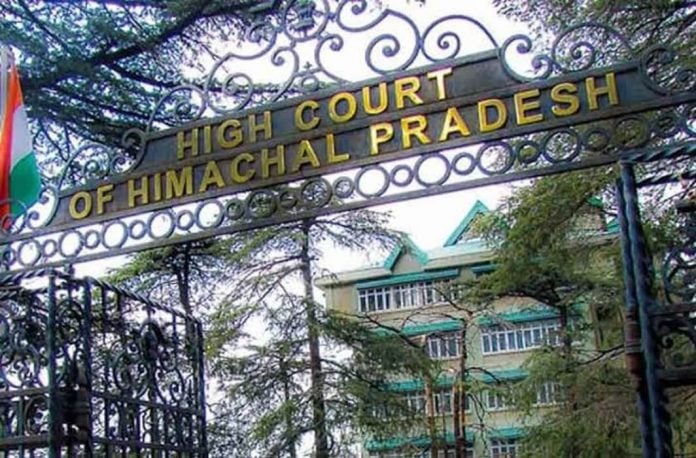The Himachal Pradesh High Court on Monday dismissed an application filed alleging that the judge who passed the order was biased while passing verdict.
A Single-Judge Bench of Justice Anoop Chitkara was considering the application seeking appropriate directions qua the judgment passed by one of the Judges of the High Court, who pronounced a dissenting verdict in Letters Patent Appeals (LPA) , and decided in favour of the petitioners; the Private Respondents/ Applicants , came up before the third Judge, under Section 151 CPC, alleging that now they have come to know that wife of the Judge who gave the dissenting pronouncement, is related to the wife of one of the Appellants and thus the judgment given by the said Judge is non est as being coram non-judice.
Senior Advocate Bipin Chander Negi representing the Private Respondents/ Applicants, Chirag Bhanu Singh and Arvind Malhotra, argued that the allegations pointed out in the application establish bias. Thus, the application deserves acceptance. He relied upon the Judgement of the Apex Court in State of Punjab v. Sumedh Singh Saini, (2011) 14 SCC 770, wherein Hon’ble Supreme Court holds that
“it is evident that the allegations of judicial bias are required to be scrutinised taking into consideration the factual matrix of the case in hand. The court must bear in mind that a mere ground of appearance of bias and not actual bias is enough to vitiate the judgment/order.”
He further relied on Supreme Court Advocates-on-Record Association and Another v. Union of India, (2016) 5 SCC 808, where the Supreme Court said that
“it is one of the settled principles of a civilised legal system that a Judge is required to be impartial. It is said that the hallmark of a democracy is the existence of an impartial Judge”.
Rakeshwar Lal Sood, Senior Advocate, who represents Private Respondents/ Applicants, Sushil Kukreja and Virender Singh, argued the applicants have a reasonable apprehension of bias, which attracts the doctrine of prejudice. He highlighted that it is the apprehension in the applicants’ minds, which is crucial while coming to bias. This bias mentioned in the application must be brought to the notice of Judge (who passed the Verdict in LPA) to seek his response about the correctness of facts.
Also Read: Delhi HC transfers plea to postpone Delhi Higher Judicial Service Main Exams 2019
The Court after hearing the submissions from the Counsels held that in the matter, the time of knowledge is the soul of the bias. If the applicants knew of the relationship before the hearing, then the bigger question is: Were the applicants waiting for the verdict’s outcome?
Applicants came to know of such relationship only after the pronouncement of the verdict. They should have mentioned the reasons for fishing an inquiry, the time of information, the source, the motive behind furnishing information, if it was given without any efforts from the applicants’ side, etc. The applicants knew the finest points of law. They would be aware of the consequences of withholding material particulars and the scope of improvements if made. Despite that, they chose not to disclose any of such particulars. They have not assigned any reasons due to which they have kept their cards closer to their chests.
The Bench observed that merely because persons are related do not establish that the relationships were working or cordial. In the fast-changing present times, there is no presumption that relatives carry good relationships. Given the demanding nature of jobs and urban life fatigue, the frequency of interactions with relatives is gradually declining. In the present times, people are connected more through social media than through physical meetings, where even the neighbours, if know each other then it is through WhatsApp, Facebook, Instagram or Twitter and if they meet outside, then even they might not recognize each other. The farther the distance from the native place, the lesser the proximity of relationships, has become the new ground reality. The Court cannot close its eyes from what is happening around us, which we all witness, experience, and go through. Thus, it was for the aggrieved to substantiate that such relationship was neither dormant nor estranged but was a working relationship, which they miserably failed to point out.
Also Read: Samajwadi Party Rajya Sabha nominee moves Allahabad HC against cancellation of his nomination
“In the application, the allegations lack necessary and material particulars. The burden was on the aggrieved to show the approximate date of knowledge of the relations, so as to steer clear of shady grey areas of reasonable doubt. The crucial aspect could have been the time period of such knowledge to enable this Court to arrive at a reasonable belief that the applicants had acquired such information after the dissenting verdict’s pronouncement and not before that. The pin-drop silence about the context due to which one or more of the respondents-applicants launched such probe or fishing inquiry to find out about the relationship is pricking this Court’s conscience. A complaint must disclose all material facts, whereas the allegations made in this application are unsubstantiated,”
-said the Court.
While dismissing the application the Court stated that the entire history of the litigation and the time of raising the issue is also significant. Suffice it to say that even if the wife of the Judge is distantly related to one of the petitioners, this nowhere implies that such Judge is prejudiced, unless the bias with all material particulars, is shown in the allegations, that too within a reasonable time.


